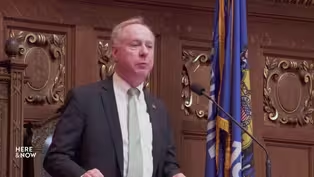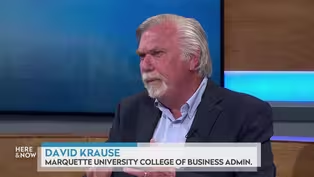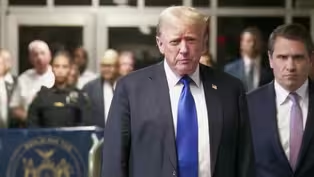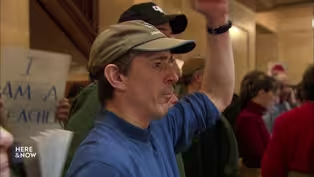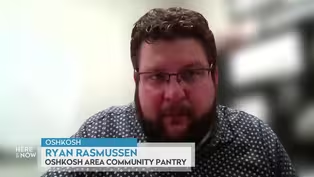Here and Now
Rep. Joel Kitchens on Bill Requiring Phonics Reading Method
Clip: Season 2200 Episode 2246 | 6m 5sVideo has Closed Captions
Joel Kitchens on a bill that requires the "phonics" method to teach children how to read.
Rep. Joel Kitchens, R-Sturgeon Bay, discusses a bill he co-authored that requires a reading method called "phonics" be brought into classrooms which describes relationships between sounds and words.
Problems playing video? | Closed Captioning Feedback
Problems playing video? | Closed Captioning Feedback
Here and Now is a local public television program presented by PBS Wisconsin
Here and Now
Rep. Joel Kitchens on Bill Requiring Phonics Reading Method
Clip: Season 2200 Episode 2246 | 6m 5sVideo has Closed Captions
Rep. Joel Kitchens, R-Sturgeon Bay, discusses a bill he co-authored that requires a reading method called "phonics" be brought into classrooms which describes relationships between sounds and words.
Problems playing video? | Closed Captioning Feedback
How to Watch Here and Now
Here and Now is available to stream on pbs.org and the free PBS App, available on iPhone, Apple TV, Android TV, Android smartphones, Amazon Fire TV, Amazon Fire Tablet, Roku, Samsung Smart TV, and Vizio.
Providing Support for PBS.org
Learn Moreabout PBS online sponsorshipWisconsin.
School is not yet out for summer, but starting next fall, the new Wisconsin law mandating how children must be taught to read goes into effect.
The law requires teaching phonics or the relationships between sounds and words instead of the current method widely in use, called three cueing, which uses such things as pictures to solve unknown words.
This comes as the latest statewide third grade reading test scores show fewer than 40% of students are proficient readers.
The reading law is in place, but the legislature is suing over the governor's veto of how $50 million to help fund the change can be used.
We sat down with one of the authors of the reading bill, Representative Joel Kitchens, as his signature legislation is now in the courts.
I know that you have said that this reading bill was the most important thing that you have worked on in the Capitol.
What's your reaction, then, to the governor's veto and the lawsuit over it?
As act 20 is really already being enacted?
>> Yeah, it's frustrating.
You know, it's sort of politics, you know, what the governor did actually with the veto was not that horrible.
It's just the precedent of that of him being able to go in and use a partial line item veto where traditionally he has not been able to use it.
And our lawyers, when they drafted the bill, said he does not have that authority.
So it would set a dangerous precedent.
And it's sort of it's similar to the PFAS problems that we're having with that bill where the governor seems to think that he can change you know, how the how the money is spent.
And that's just going to be a problem.
>> But meanwhile, it kind of catches this whole piece of policy, right?
In the midst of that veto and the lawsuit now.
Right >> So it's unfortunately my bill ends up sort of being a test case on this.
That's really unfortunate.
So hopefully it doesn't slow it down too much.
I know there are portions of it and I've been in touch with DPI about it.
I think, you know, as far as the testing and the assessments, they'll have the money for that.
But hiring the coaches statewide, certainly they do not have that money.
So until this lawsuit is settled, that won't happen.
You know, we are encouraging the schools as far as getting the training for the teachers as buying new that.
You know, we will have the money there.
It's just it's just the lawsuit has to play out.
>> So the governor's veto message also spoke to the idea that he wanted to give DPI the flexibility of where to put this money, do you take exception to that?
much as because I think we're on the same page on it.
It's really, really unfortunate with this.
And again, some other bills that he didn't just talk to us.
You know, because I think we can work out the details of this.
It's just that when you do that in an area that's never where that's never been allowed before, it's a problem.
And I know when he first did that, you know, I talked to the members of JFC and they were back and forth.
Well, you know, should we challenge this?
But I think they decided that, yeah.
The precedent it's too strong to ignore that and let him do that because then it'll continue to escalate from there.
>> Is there anything to the idea that Republicans might have been concerned because he vetoed a part of the appropriation that would have given per pupil increase to private choice schools and independent charter schools?
>> You know, I haven't heard that be part of the concern with it, you know, what I'm hearing from JFC is just that it's the precedent of it.
And, yeah, there's a lot of distrust of DPI, but I think, you know, again, the substance of what that partial veto did is not the big deal.
It's just the precedent.
this act 20 is going into effect in the fall.
Right.
Have you heard from educators about, you know, concerns they might have about being able to be ready to do that?
address some of those.
There were a lot of concerns.
So we made the first assessment which would have taken place in September.
We made that optional.
So they don't have to do that until later because we were trying to, you know, to speak to their fears.
And now with this, of course, everybody's like, what's going on?
So again, we keep telling people and I think DPI is giving them the same message.
Just go ahead, go forward.
You know, you're you're the money's going to be there.
And it's really important that we get this going.
you've done around this important issue for you, how soon do you think these kinds of changes will result in more children being able to read at a proficient level?
pretty rapid.
I think that in two years we will see the difference in those kids.
And again, this is, you know, kids learn to read.
There's not a more important thing in their whole lives than learn to read.
If they don't learn how to read, their chances of success in school and really in life are so diminished that this is really important.
And I was, you know, gratified to hear Speaker Vos when he gave his end of the session, wrap up.
He said this was the most important thing that we passed this session, too.
And I think it really is.
And so, you know, we have to get this going.
And I think, I think we'll see progress pretty quickly because going back to Wisconsin's reading test scores is what is that like for you as someone who works on these issues to see that?
Yeah it's pretty awful.
And you know, our African American students have fallen from where they used to be, kind of middle of the pack.
Now they're dead last in the country.
So we have got to turn that around.
It's just it should really scare people to think of what that means to the future of these kids.
And then you throw the pandemic in on top of it, where some of those kids just and unfortunately, especially in real instruction for a year.
Well, you can't take a year off from school when you're in from school when you're in
9,000 Signatures Submitted in Another Effort to Recall Vos
Video has Closed Captions
Clip: S2200 Ep2246 | 25s | Signatures were submitted in a second attempt to recall Assembly Speaker Robin Vos. (25s)
Could drought strand mussels again?
Video has Closed Captions
Clip: S2200 Ep2246 | 6m 11s | Drought caused thousands of mussel strandings in 2023, could it happen again a year later? (6m 11s)
David Krause on WRS Investing Millions into a Bitcoin ETF
Video has Closed Captions
Clip: S2200 Ep2246 | 5m 27s | David Krause on the Wisconsin pension system's $100 million purchase into a Bitcoin ETF. (5m 27s)
Here & Now opening for May 31, 2024
Video has Closed Captions
Clip: S2200 Ep2246 | 1m 21s | The introduction to the May 31, 2024 episode of Here & Now. (1m 21s)
Oral Arguments Over Act 10 Lawsuit in Dane County Court
Video has Closed Captions
Clip: S2200 Ep2246 | 1m 24s | Lawsuit challenging Act 10 heard oral arguments from those representing public employees. (1m 24s)
Ryan Rasmussen on New I.D. Requirements for Food Pantries
Video has Closed Captions
Clip: S2200 Ep2246 | 5m 21s | Ryan Rasmussen on new identification rules to access food pantries receiving federal aid. (5m 21s)
Providing Support for PBS.org
Learn Moreabout PBS online sponsorship
- News and Public Affairs

Top journalists deliver compelling original analysis of the hour's headlines.

- News and Public Affairs

FRONTLINE is investigative journalism that questions, explains and changes our world.












Support for PBS provided by:
Here and Now is a local public television program presented by PBS Wisconsin
